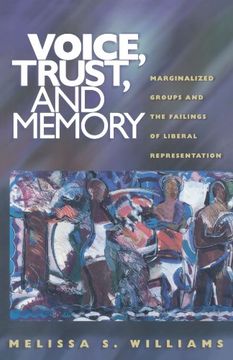Share
Voice, Trust, and Memory: Marginalized Groups and the Failings of Liberal Representation (in English)
Melissa S. Williams (Author)
·
Princeton University Press
· Paperback
Voice, Trust, and Memory: Marginalized Groups and the Failings of Liberal Representation (in English) - Melissa S. Williams
$ 3.49
$ 4.98
You save: $ 1.49
Choose the list to add your product or create one New List
✓ Product added successfully to the Wishlist.
Go to My WishlistsIt will be shipped from our warehouse between
Monday, June 10 and
Wednesday, June 12.
You will receive it anywhere in United States between 1 and 3 business days after shipment.
Synopsis "Voice, Trust, and Memory: Marginalized Groups and the Failings of Liberal Representation (in English)"
Does fair political representation for historically disadvantaged groups require their presence in legislative bodies? The intuition that women are best represented by women, and African-Americans by other African-Americans, has deep historical roots. Yet the conception of fair representation that prevails in American political culture and jurisprudence--what Melissa Williams calls "liberal representation"--concludes that the social identity of legislative representatives does not bear on their quality as representatives. Liberal representation's slogan, "one person, one vote," concludes that the outcome of the electoral and legislative process is fair, whatever it happens to be, so long as no voter is systematically excluded. Challenging this notion, Williams maintains that fair representation is powerfully affected by the identity of legislators and whether some of them are actually members of the historically marginalized groups that are most in need of protection in our society. Williams argues first that the distinctive voice of these groups should be audible within the legislative process. Second, she holds that the self-representation of these groups is necessary to sustain their trust in democratic institutions. The memory of state-sponsored discrimination against these groups, together with ongoing patterns of inequality along group lines, provides both a reason to recognize group claims and a way of distinguishing stronger from weaker claims. The book closes by proposing institutions that can secure fair representation for marginalized groups without compromising principles of democratic freedom and equality.
- 0% (0)
- 0% (0)
- 0% (0)
- 0% (0)
- 0% (0)
All books in our catalog are Original.
The book is written in English.
The binding of this edition is Paperback.
✓ Producto agregado correctamente al carro, Ir a Pagar.

